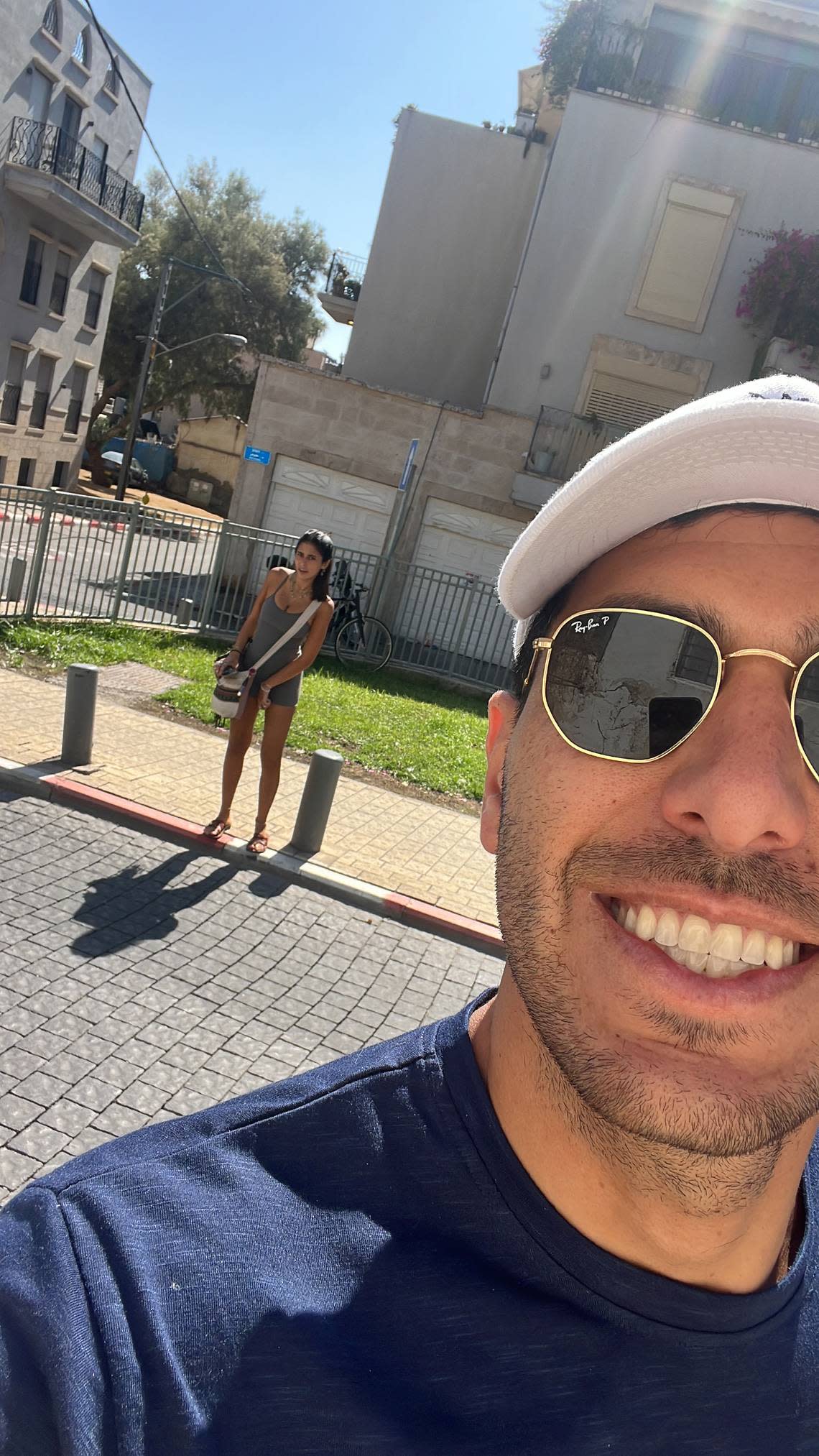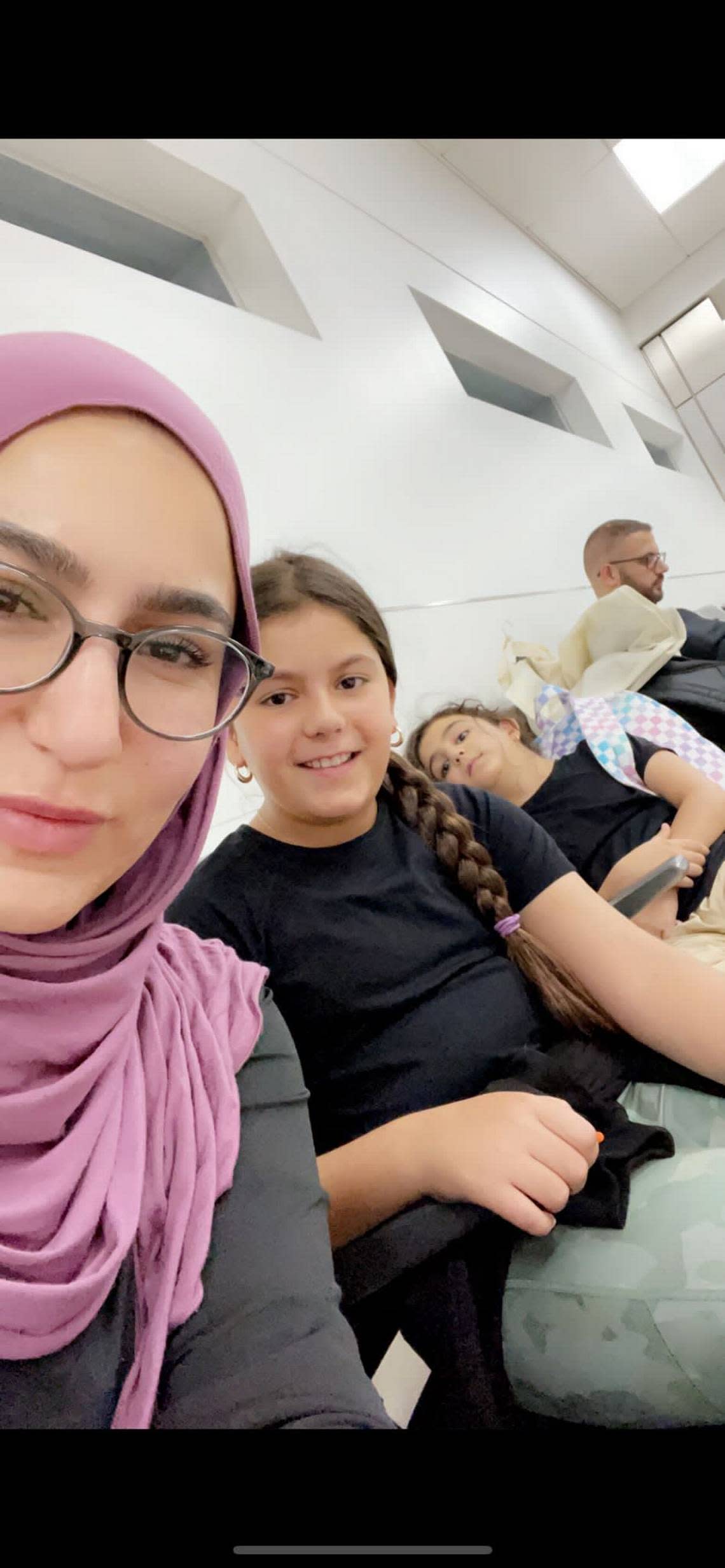These South Floridians were in the region when Israel was attacked. They’re still there
One was awakened by sirens and ran to a bomb shelter in his friend’s home.
Another saw war planes flood the sky.
A third was in Jerusalem to honor two family members who died in the Surfside condo collapse.
These are among the South Floridians who found themselves in Israel or the West Bank when Hamas militants launched a full-scale attack Saturday from the Gaza Strip into Israel, killing more than 1,000 civilians, including at least 14 Americans, President Biden said Tuesday. Palestinian authorities said more than 800 people have been killed in an Israeli counterattack in Gaza, which Hamas has governed since 2007.
South Florida, with one of the largest Jewish communities in the nation, has many ties to Israel, through faith, families and culture.
“We all know somebody; we’re all connected,” said Sharon Israel Moskovitz, executive director of Temple Judea in Coral Gables.
READ MORE: ‘We are one people’: Thousands of Floridians support Israel at rally in Miami Beach
Here, then, are their stories:
‘How do we navigate this unprecedented time?’
Sharon Israel Moskovitz, who was born in Israel, says she’s been checking in daily with her family in Tel Aviv — Facetiming with cousins and calling her mother — to make sure everyone is safe.
“The things that are going on are horrible. They’re heinous crimes; It is unfathomable,” said Moskovitz. “When something is going on your innate response is to do something. You feel helpless.”
During Sunday school at Temple Judea, the day after the attacks, the air in the packed room was heavy, the mood, solemn, Moskovitz said. People were hugging, crying, conversing about the people they know who are affected.
“Because South Florida has such a huge population of Jewish people and Israelis … we’re all kind of walking around, like what can we do? How can we support? How do we listen? How do we navigate this unprecedented time?”
In Israel, where the military plays a large role in protecting the country, everyone knows someone who’s being drafted to fight in the Israel Defense Forces, said Moskovitz.
“It could be your friend’s parents. It could be your teacher. It’s not so much removed that it’s just the people who are in the military today that we know,” she said. “It’s your friends. It’s your neighbor. It’s everybody who’s being called to come and fight for survival and to defend our citizens.”
‘It’s barbaric. There’s a lot of hatred for people they never met’
Guy Gil, a 29-year-old real estate developer from Sunny Isles Beach, was visiting his family in Herzliya near Tel Aviv at the time of the attacks.
On Saturday, he was supposed to sit Shiva to mourn his grandfather, who passed away last week in Israel. But he was awakened early Saturday morning to a missile siren. He ran to the bomb shelter in his friend’s home where he was staying — as he has done many times before — and after waiting 10 minutes for the explosion and debris to settle, Gil went back to sleep.
A few hours later, Gil woke up to 20 missed calls from family and friends, soon realizing this wasn’t a one-off missile attack, but the beginning of a war.
“My mom panicked that I had died at that point because I didn’t answer,” said Gil, referring to his mom’s call from South Florida. “I look at my phone. And there’s thousands of notifications: Siren, siren, siren. Red Alert, Red Alert, Red Alert.”

Gil remembered that his 22-year-old cousin was going to a party the night before the attack, soon realizing she was among the 3,500 young people who attended the Supernova Music Festival near the Gaza Strip, one of the first targets of the Hamas attacks. Hamas militants killed more than 260 people at the festival site and took hostages.
“We started putting two and two together like, Okay, this is a terrorist attack,” Gil said. “They’re going through the gate. They’re kidnapping people. They’re murdering. Is she alive? Is she not alive? Is she hurt? Is she not hurt? I heard she’s hurt, is she actually? We don’t really know what’s going on.”
For more than five hours, Gil had no idea what happened to his cousin. After a scramble through social media posts and phone calls, her family eventually picked her up from a holding area and transported her to a local hospital, where she’s been recovering.
“She has grenade pieces in her skin and in the back of her skull,” Gil said. “She’s a tough cookie. There’s no denying that. This girl is tough as nails.”
Through an app called Telegram, Gil has been receiving disturbing videos and photos of the horrid attacks. His friends who have been deployed are sending photographs of body bags and sharing horror stories of women and babies being killed, he said in a phone interview with the Herald from Israel, pausing at times to collect himself.
“It’s barbaric. There’s a lot of hatred for people they never met,” he said. “We’re all one Jewish people and we all have to learn to stick together and persevere otherwise there won’t be the Jewish people.”
‘Everyone was in shock. It was like the calm before the storm’
Lana Shehadeh’s Palestinian parents came to America in the 1970s in search of the American dream. Shehadeh, who was born and raised in Parkland, moved to the West Bank with her two daughters, Lilly and Talia, in 2020 to finish her Ph.D on religion and politics.
Shehadeh was at the grocery store in the West Bank on the day of the attack; she saw war planes flying above.
“Everyone was in shock. It was like the calm before the storm,” said Shehadeh, who is an assistant professor of political science at the Arab American University. “Nobody knew what to do. We were nervous to get out because if the military comes in, they might raid the town.”
The village that Shehadeh and her daughters live in is near a large Israeli settlement in the West Bank, which means she lives under control of the Israeli authorities. Soon after the attack, her village was locked down.
Shehadeh recognizes how her experience differs from a Palestinian living in Gaza — the narrow strip of densely populated land between Israel and Egypt that’s fraught with violence. But life in the West Bank also means restricted access to water and electricity.
“What I would want the average American to understand, aside from what’s going on, which is extremely unfortunate events, is that in the day-to-day life of Palestinians in the West Bank, the occupation affects every aspect of our lives,” said Shehadeh.
During her morning commute to her daughters’ school in Ramallah, Shehadeh passes two Israeli settlements, Ofra and Beit El, which means passing through checkpoints — she describes them as man-made tunnels — and encountering soldiers with machine guns who ask questions about where they are headed.
“This became a daily image for these two little girls who were born in Boca Raton, Florida,” she said.
Her daughters are 7 and 9 years old.

As an American with Palestinian roots, Shehadeh considers herself a “privileged member of society” as evidenced by her ability to travel easily throughout Israel and the Middle East — something that is restricted for Palestinians. She’s told the purpose of the checkpoints is for security reasons, but she says they they feel like a way to keep tabs on the Palestinian town.
“Regardless of what I feel about the Israeli authorities, these soldiers are doing their job and their job is part of a military occupation,” she said. “It’s colonialism. It’s some form of colonialism.”
Shehadeh thinks both sides are looked at as the enemy, depending on the context. She wants people — especially Americans — to see Palestinians as individuals.
“I think Palestinians are not humanized. They’re looked at as ‘the other’” she said, referring to how Hamas militants and everyday Palestinians are often grouped together.
“I’m not giving them any kind of excuses, but we do need to contextualize what’s going on,” she said. “When you’re allowing your government to manipulate and oppress a full society, that society is going to lash out. It’s just part of human experience.”
‘This war started on the most joyous day of the year’
Rabbi Raphael Tennenhaus of the Chabad of South Broward has been in Jerusalem with his wife, Goldie, to celebrate the Jewish holidays. They were at a synagogue for festivities when they received news of the Hamas attack.
“We are safe and feel 100 percent safe because Israel is the safest place in the world,” he said. “We believe what the Torah says, that the eyes of God are upon this land.”
He said they heard no alarm sirens and observed no panic and that people in Jerusalem remain calm as they go about their daily lives. They have been struck by the sight of many young people, dressed in their Army uniforms, in the streets of the city, awaiting transportation to their posts.
“This war started on the most joyous day of the year, Simchat Torah, and everyone in our movement learns that with joy we will overcome obstacles,” he said.
Tennenhaus said he is saddened by the never-ending cycle of vengeance in the region. His uncle served in the Israeli Army during the 1967 war between Israel and neighboring Arab countries.
“We are shocked and pained at how our brothers and sisters were murdered, kidnapped and publicly humiliated to the cheering of terrorists,” he said. “Not since the Holocaust, in which both Goldie’s grandparents and my grandparents were paraded in public and ruthlessly murdered, have Jews been subject to such a horrific level of torture and abuse as they have the last few days.”
During his visit, Tennenhaus is picking up a Torah Scroll being written in memory of Goldie’s sister and brother-in-law, Itty and Tzvi Ainsworth, who died in the Champlain Towers collapse in Surfside that killed 98 people on June 24, 2021.
READ MORE: Ordinary moments turned extraordinary in the final hours before Surfside condo collapse
“We will leave a few letters unfinished, and when I return we will have a tremendous completion ceremony in honor of all who died,” he said. “The dedicated Torah will have a permanent home at our Congregation Levi Yitzchok-Lubavitch in Hallandale Beach.”
Is peace possible? Tennenhaus does not foresee a diplomatic solution.
“The only answer is in the prophecy of our Rebbe, Rabbi Menachem M. Schneerson, that the messiah is on the way, and the final redemption will soon unfold,” he said. “I do not see any other solution.”
This report was created with philanthropic support from Christian, Muslim and Jewish funders in partnership with Journalism Funding Partners. The Miami Herald retains editorial control of all work.
